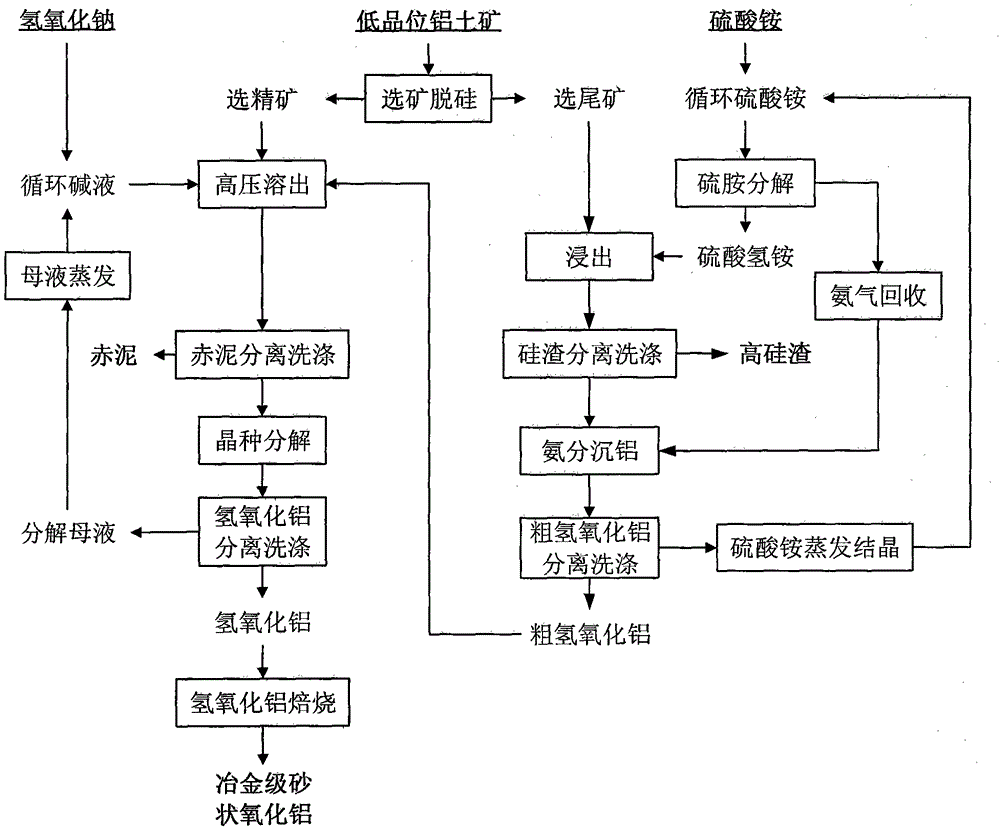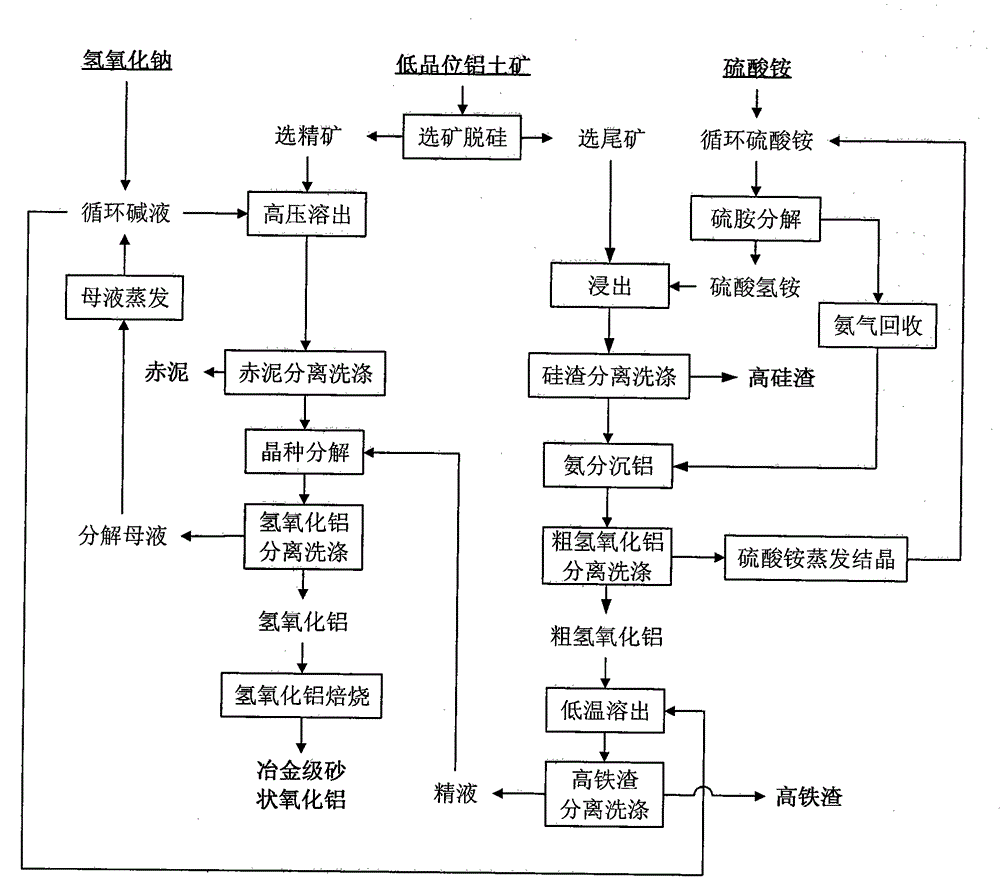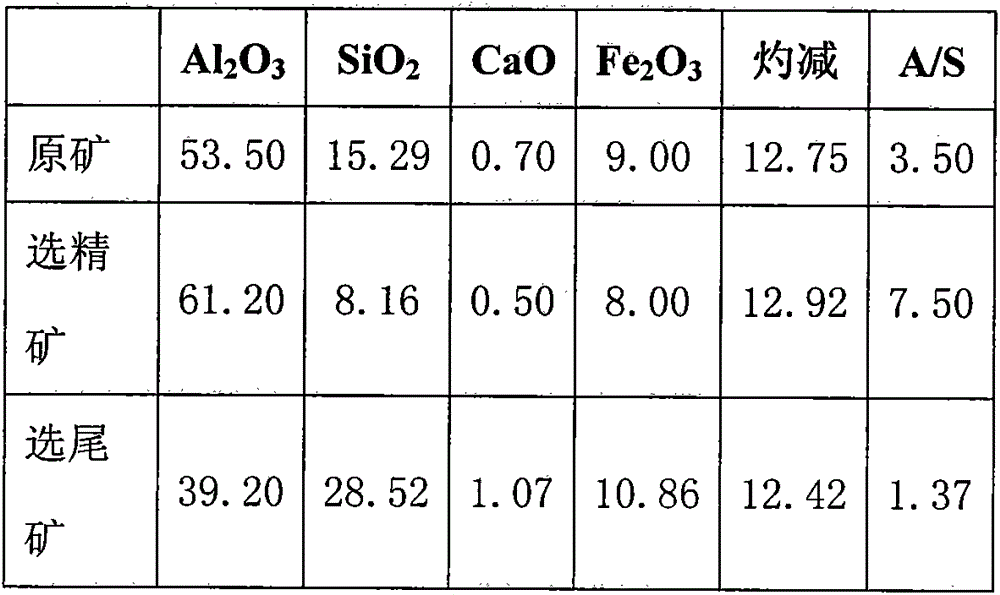Method for producing aluminum oxide by treating low-grade bauxite with ammonia-alkali combination method
A technology of low-grade bauxite and combined method, which is applied in the direction of alumina/hydroxide, etc., can solve the problems of low resource utilization, high energy consumption, and low recovery rate, and improve the comprehensive utilization of resources and energy consumption. low effect
- Summary
- Abstract
- Description
- Claims
- Application Information
AI Technical Summary
Problems solved by technology
Method used
Image
Examples
Embodiment 1
[0028] The composition of low-grade bauxite, concentrated ore and tailings is shown in the table below, and the ore composition of other embodiments is the same as this table.
[0029]
[0030] 1000g of low-grade bauxite is desiliconized by positive flotation to obtain about 650g of concentrate and 350g of tailings. The concentrate is processed according to steps A1-A5, and the tailings are processed according to steps B1-B5.
[0031] A1. High-pressure stripping: After the concentrated ore is mixed with the circulating lye, it is stripped at 265°C under high pressure (naturally formed at a pressure of 265°C, the same below) for 60 minutes;
[0032] A2. Separation and washing of red mud: After the dissolution, the slurry is separated and washed with red mud;
[0033] A3. Decomposition of seed crystals: After the semen is cooled to 65°C, add seed crystals to decompose;
[0034] A4. Separation and washing: after separation and washing, aluminum hydroxide and decomposed mother...
Embodiment 2
[0043] 1000g of low-grade bauxite is desiliconized by reverse flotation to obtain about 650g of concentrate and 350g of tailings. The concentrate is processed according to steps A1-A5, and the tailings are processed according to steps B1-B5.
[0044] A1. High-pressure stripping: After the concentrated ore is mixed with circulating lye, it is stripped at 290°C for 10 minutes under high pressure;
[0045] A2. Separation and washing of red mud: After the dissolution, the slurry is separated and washed with red mud;
[0046] A3. Decomposition of seed crystals: After the semen is cooled to 65°C, add seed crystals to decompose;
[0047] A4. Separation and washing: after separation and washing, aluminum hydroxide and decomposed mother liquor are obtained; the decomposed mother liquor is evaporated and prepared to obtain circulating lye and sent to step A1 for recycling;
[0048] A5. Roasting of aluminum hydroxide: aluminum hydroxide is roasted at 1050°C to obtain metallurgical grade...
Embodiment 3
[0056] 1000g of low-grade bauxite is desiliconized by positive flotation to obtain about 650g of concentrate and 350g of tailings. The concentrate is processed according to steps A1-A5, and the tailings are processed according to steps B1-B5.
[0057] A1. High-pressure stripping: After the concentrated ore is mixed with circulating lye, it is stripped at 300°C for 5 minutes under high pressure;
[0058] A2. Separation and washing of red mud: After the dissolution, the slurry is separated and washed with red mud;
[0059] A3. Decomposition of seed crystals: After the semen is cooled to 65°C, add seed crystals to decompose;
[0060] A4. Separation and washing: after separation and washing, aluminum hydroxide and decomposed mother liquor are obtained; the decomposed mother liquor is evaporated and prepared to obtain circulating lye and sent to step A1 for recycling;
[0061] A5. Roasting of aluminum hydroxide: aluminum hydroxide is roasted at 1050°C to obtain metallurgical grade...
PUM
 Login to View More
Login to View More Abstract
Description
Claims
Application Information
 Login to View More
Login to View More - R&D
- Intellectual Property
- Life Sciences
- Materials
- Tech Scout
- Unparalleled Data Quality
- Higher Quality Content
- 60% Fewer Hallucinations
Browse by: Latest US Patents, China's latest patents, Technical Efficacy Thesaurus, Application Domain, Technology Topic, Popular Technical Reports.
© 2025 PatSnap. All rights reserved.Legal|Privacy policy|Modern Slavery Act Transparency Statement|Sitemap|About US| Contact US: help@patsnap.com



